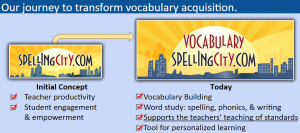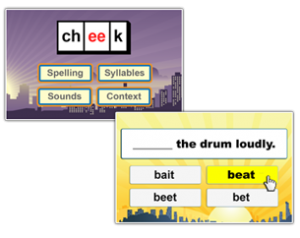WritingCity incorporates the most successful teaching methods. Our instruction weaves together the best elements of 6 Traits, Writer’s Workshop, Bloom’s Taxonomy, Multiple Intelligences, Marzano's Instructional Strategies, and Cooperative Learning. With more than 200 combined years of classroom teaching experience, WritingCity curriculum creators know what works for developing writers.
If your elementary school isn't ready for a full writing curriculum, many teachers and schools rely on the writing practice (fused with vocabulary development ) offered by VocabularySpellingCity.
VocabularySpellingCity has two activities for students to practice writing using their word lists. These activities help students simultaneously develop their vocabulary and writing skills.
VocabularySpellingCity two activities, Sentence Writing Practice and Paragraph Writing Practice, Plus Handwriting practice. VocabularySpellingCity allows users to print out any word list as a handwriting worksheet. Each word appears on a separate line on handwriting paper in light writing for tracing, with plenty of space for handwriting practice.
VocabularySpellingCity is also popular with homeschoolers for writing practice.
Another interesting alternative for practicing writing is to enroll in a Time4Writing online writing practice class.

Students who want to improve their writing skills have a number of ways to seek help. Tutors, peer review, and books about writing can all benefit, but online writing courses are usually the mode that modern students prefer to advance their abilities as writers.
Which students are most likely to benefit from web-based writing instruction?
Homeschooled Students and Online Writing Courses
Writing can be a difficult subject to teach from home. Homeschool parents often find themselves in power struggles when grading their student’s writing. They also worry that they might be leaving vital gaps in the teaching. Choosing an easy writing curriculum for homeschool that is also a good fit for the student is one of the most daunting tasks a parent faces.
Online writing courses usually integrate the writing standards that students are supposed to master at each grade level. That means that parents can feel assured students are getting a strong foundation of skills. Having a student’s writing assessed by someone other than the parent also takes much of the stress out of writing instruction.

